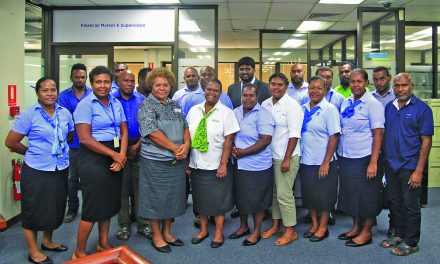Remarks by Deputy Governor Gane Simbe at the official opening of the PFIP Ideation Workshop on saving clubs at the Heritage Park Hotel on 11 September 2017.
Gane Simbe
Deputy Governor, Central Bank of Solomon Islands
Official Opening of the PFIP Ideation Workshop on Saving Clubs – Heritage Park Hotel
Honiara – 11th September, 2017
I thank PFIP team for inviting me to do the honor of making some brief remarks at the start of your workshop this morning, which focuses on exploring ideas on how to link savings clubs to formal financial institutions.
Let me begin first by acknowledging the PFIP for the support and for the work that it has been doing in progressing financial inclusion in our country and importantly, on the projects with Savings Clubs that are so unique and necessary from the Solomon Islands context.
We recognize the earlier work that PFIP had done in developing the Savings club manual with best practices following extensive field studies and thereafter their on-going support to institutions like World Vision, Live & Learn, Mother’s Union, Ministry of Women and others in promoting savings clubs in the remote rural communities of the country, primarily targeting women.
This workshop, which will facilitate the next steps, in the exploring linkage of savings clubs with formal financial services, is indeed a good step forward and is in line with the National Financial Inclusion Strategies that CBSI is implementing.
At the same time on behalf of the CBSI, I acknowledge the support of the Australian Government in this initiative, as well as their broader support to financial inclusion in the country.
As I was pondering over objective of this workshop, and the word “ideation”, which could be new to some of you, I think of a story regarding product development and the patience that might be required before a new product or service is accepted in the market. Let me tell you this story.
In 1968 a scientist named Dr. Spencer Silver1, who was working for an American company known as 3M in Kentucky was attempting to develop a super-strong adhesive (glue).
However, instead of achieving his outcome for a super-strong glue, he accidentally created, the opposite; a low tack reusable, pressure-sensitive adhesive.
For 5 years, Silver promoted his discovery within the 3M and conducted seminars to gain acceptance of his product. But there was no interest; for a low sticky adhesive.
However, in 1974 a work colleague named Arthur Fry, who attended one of Silver’s seminars decided to use the adhesive to anchor his bookmarks in his hymnbook. The rest is history. A new product was created; it is this yellow pad called “POST IT”!
And wait, the yellow color that POST IT is famously identified with was chosen by accident as well! A lab next door to the POST IT team from 3M just only had yellow scrap paper!
So in the next 2 days of this ideation workshop, under the expert guidance of your workshop facilitator Tanya Rabourn of GRID Impact and who is engaged by PFIP to guide this ideation processes, you all must come up with potential products or services for the savings clubs in Solomon Islands.
Your ideas will assist in the development of new products for saving clubs, or services that takes the savings clubs to the next level with the goals of enlarging and deepening the benefits to saving club members and what they can receive from their savings. As well as linking the savings clubs to formal financial institutions.
Those of you who are present here are from saving club groups around the Solomon Islands. All of you are experts on what your members want or would like see offered in your savings clubs. With the help of your facilitator, you can bring out what you have in your minds and turn them into products or services that can lift up the operations of the savings clubs, and linking them to the formal financial sector.
Therefore, whether by design or accidental discovery as illustrated in the POST_IT story, you can put on your critical thinking process and creative minds in the next two days to come up with new or improved products or services for your saving club members.
A word of caution though; in designing your products or services whether they be still paper based or digital, remember the rural savers are concerned with the safety of their savings. Therefore, I urge you all to come up with products that removes or lessen one of the hurdles in the minds of our rural savers in terms of opening saving accounts with licensed financial institutions, the notion on fees or charges.
For some of your rural saving club members, the little sum they save in your saving clubs represents their hard earned surplus’ that they want to keep for the future or rainy days. They want to see it grow and not to be reduced by fees. So be creative with your ideas and come up with products that that are simple and easy to understand, easy to use, can be accessible, and benefit your members, but never compromise the safety of the members’ savings. Include in your suggestions educational products to educate rural savers on the fact that in providing financial services, it costs money and some reasonable service fees needs to be paid up as well.
In conclusion, I would once again acknowledge PFIP for organizing this workshop and Tanya Rabourn who will be your facilitator for the workshop. As we can learn from the Post-IT story, new products or services can be discovered by accident, and the products or services that you might come up with during the next two days may not have an immediate acceptance today, but can become best products in five years.
I wish you all a fruitful ideation workshop.


